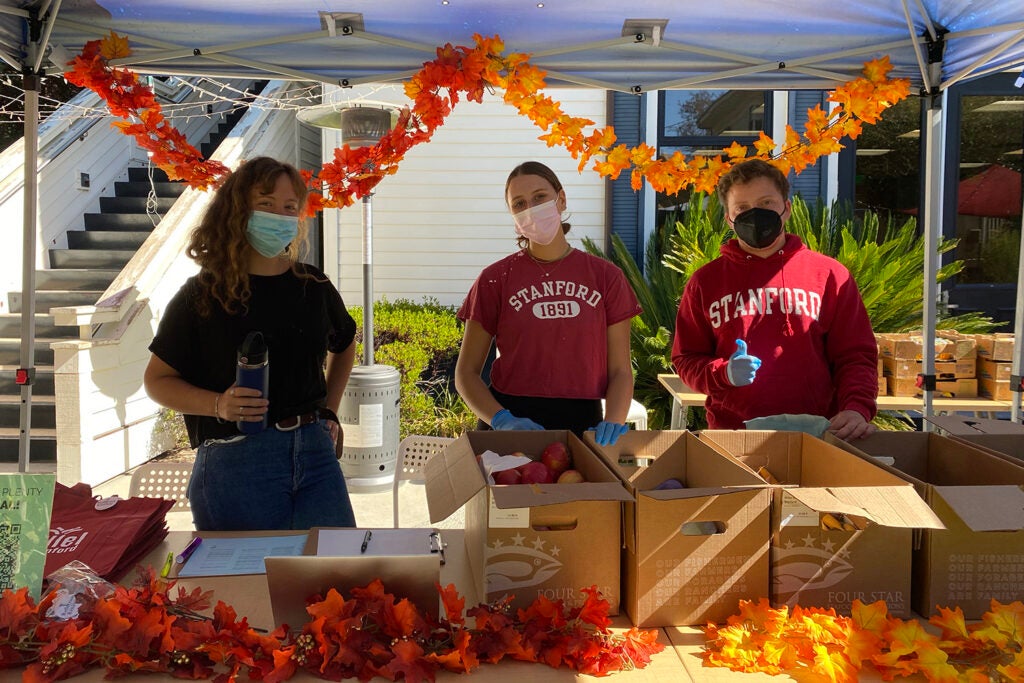Hillel at Stanford’s monthly Spreading Plenty festival celebrates well-being
The monthly Spreading Plenty festival, offered through Hillel at Stanford’s SHEFA Initiative, includes a Community Supported Agriculture program and family-friendly activities.
Each month, Hillel at Stanford seeks to help nourish the minds, bodies and souls of those in the Stanford community with a celebration of well-being, abundance and community.

The Spreading Plenty festival, offered through Hillel’s SHEFA Initiative, includes a Community Supported Agriculture program and family-friendly activities. (Image credit: Sarah Tibbitts)
The monthly Spreading Plenty festival includes a Community-Supported Agriculture (CSA) program and family-friendly activities such as live music, yoga, arts, crafts and more. It is offered through Hillel’s SHEFA Health and Well-Being Initiative, which elevates student well-being on campus and is now focusing on two issues magnified in the pandemic: food security and mental health.
“Shefa means abundance in Hebrew, and it’s recognizing that we’re so much stronger in community, where we can draw upon our collective resources,” said Initiative Director Rebecca Pearl Schisler. “When we come together, we have more than enough, and we can support people to thrive and flourish on every level. That’s the attitude and approach behind the SHEFA program and initiatives.”
The SHEFA acronym stands for Spiritual resilience, Holistic health, Emotional well-being, Food security and Abundance. The program consists of a student fellowship and various initiatives to support the Stanford community in learning skills to cultivate mental, emotional and physical well-being, integrate it into academic or career pursuits and access related resources.
Creating community
Hillel – which aims to empower Jewish students at Stanford to explore and deepen their Jewish identities – began offering a monthly CSA program to all Stanford students, faculty, staff and community members last year to increase access to local produce and pantry staples. The program is available to students and postdocs on a pay-what-you-can basis and to faculty and community members at cost.
The pandemic also highlighted a need for purposeful community building as people became increasingly isolated and lonely. Soon, the CSA program blossomed into the Spreading Plenty festival to help meet that need. Turnout has been particularly strong for students and postdocs with families, Schisler said.
“People have responded really positively. I think it’s nice for parents to schmooze while their kids are playing, and we offer activities for adults that are enjoyable as well,” Schisler said. “It’s a beautiful contribution to the community and to people’s mental health.”
Leila Bronnert DeSchepper became a SHEFA Fellow in January 2021 and helps organize projects centered around well-being. She particularly enjoys finding new activities for children at the festival.
“I think people are very appreciative of it and not just for the food but for the community aspect,” DeSchepper said. “I love that inclusivity.”
She said what sets this event apart from other CSAs she has been a part of is the festive atmosphere.
“You’re not going to drive up, get a box and leave. People are staying for dinner, mingling with their friends and a concert,” DeSchepper said. “I think that’s a really unique thing to serve a community’s needs while also creating this connecting and upbeat atmosphere.”
The festivities usually last about three to four hours and revolve around a monthly theme such as gratitude and abundance for November or celebrating Hanukkah for December. An average of 40 people have attended each month since they began, and the event is open to everyone in the Stanford community.
“Roughly two-thirds of those who come are from the Jewish community and a third from outside, which has been wonderful,” Schisler said. “We value and are looking to build out more interfaith initiatives. There’s so much potential at the intersection of spirituality and well-being for different faith groups to come together and collaborate with one another.”
Many served in the program are part of Stanford’s international community and working or studying while supporting their children and spouses.
“The cost of living out here is really expensive,” Schisler said. “In Silicon Valley, it’s a lot harder to make ends meet so addressing this issue of food insecurity makes a big difference for some students and their families.”
People can sign up online to receive a box through the program. The produce comes from local, family-owned farms using sustainable practices. Dry goods are free and provided by the Rahima Foundation, a Muslim Bay Area nonprofit.
When people pick up their box at the event, there’s no indication of who is receiving the food for free versus those who are paying for it, an intentional design element.
“Sometimes there can be a stigma around needing assistance with food and so that was done to reduce that stigma and make people feel more comfortable with asking for support,” Schisler said.
The SHEFA Well-being Initiative also offers free morning yoga classes and a variety of mental health resources. With the support of eight student interns, it plans to expand its offerings to include mindfulness and movement sessions as well as support groups.
“Our hope is that over time, this mini-festival can become a signature event on campus and that undergrads, as well, are drawn to its celebratory energy that has to do with wellbeing, and isn’t just partying, but engaging in activities and food that are nourishing to our bodies, hearts and souls,” Schisler said.
The festival is held at Hillel at Stanford, located at Mayfield Avenue and Campus Drive, and dates vary each month. For more information or to be added to the SHEFA Well-being Initiative mailing list, email Rebecca Pearl Schisler at rebschis@stanford.edu. The CSA order form is available here.